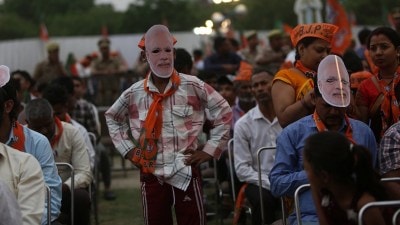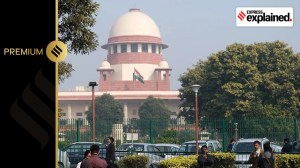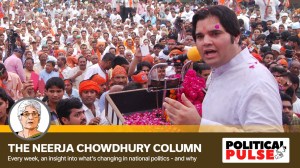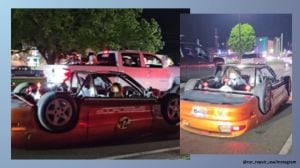- India
- International
At Umar Khalid’s bail hearing, Delhi HC deliberates on meaning of ‘inquilab’: ‘Revolution not necessarily bloodless’
Court continues to question speech made by Umar Khalid at Amravati in February 2020, says he could have used “some other words” for Prime Minister Modi.
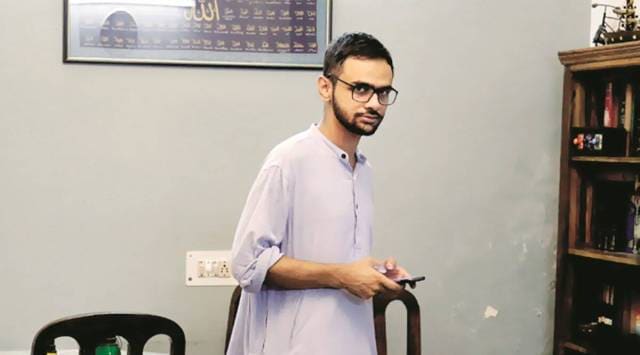 Khalid’s counsel submitted that the witness statements cited by the prosecution or Delhi Police as evidence are without any basis and cannot be even considered prima facie. (File Photo)
Khalid’s counsel submitted that the witness statements cited by the prosecution or Delhi Police as evidence are without any basis and cannot be even considered prima facie. (File Photo)The Delhi High Court Friday continued to question the speech made by activist Umar Khalid at Amravati in February 2020 and said he could have used “some other words” for the Prime Minister. It also sought to know in what context the term ‘krantikari’ (revolutionary) was used by Khalid before the audience. The former JNU student is an accused in the larger conspiracy case of the Northeast Delhi riots.
“When you are stressing on ‘Hindustan main sab changa si…’ (everything is alright in India)… then Hindustan main sab changa si… purn viram (full stop). It could have been like this also,” observed Justice Rajnish Bhatnagar, during the hearing of Khalid’s bail plea in the case.
The bail appeal is being heard by the division bench of Justice Siddharth Mridul and Justice Bhatnagar which on Friday sought to hear Khalid’s speech again for the third time. Khalid, in his speech, had juxtaposed PM Narendra Modi’s statement of ‘Hindustan main sab changa si’ with the action of authorities in Gujarat building a wall to hide slums in February 2020 from then US President Donald Trump during his visit to Ahmedabad.
“Hamare desh ke pradhan mantri ko sharam aati hai … ki Donald Trump ko ye pata na chal jaye ki Hindustan mein sab changa si nahi hai… (The Prime Minister of our country is feeling ashamed… He does not want Donald Trump to know that everything is not alright in India…),” Khalid had said at Amravati. The speech is part of the chargesheet against him.
On the use of the word “nanga (naked)” during the same speech, senior advocate Trideep Pais, representing Khalid, termed said it was used as a metaphor like ‘the emperor’s new clothes’, and submitted that the statement means that lack of development was sought to be deliberately hidden from a foreign dignitary in India. “What he means rhetorically is that you are hiding the truth,” Pais submitted, asking how such a statement is crime or exhortation to violence.

Justice Bhatnagar said Khalid in his speech had repeatedly referred to Mahatma Gandhi, and asked whether Gandhi had ever mentioned “these words” against the Queen. Pais responded that a lot of worse has been said about the head of state.
“In Bengaluru, in a public sitting, the former Finance Minister of this country referred to the then sitting Prime Minister of this country as ‘napunsak’ (impotent). We are not in a defamation complaint. We are not in a complaint where any vulgar word is termed as something wrong. We are looking at whether this speech resulted in terror or was exhortation in terror,” he argued.
In response to the court’s previous questions regarding the use of words like “inquilabli salam” (revolutionary salute) and “krantikari istiqbal” (revolutionary welcome) by Khalid at the beginning of his speech, Pais on Friday submitted a compilation of 10 documents to explain the meaning of the word revolution or inquilab. Pais also presented a podcast titled ‘Revisiting Bhagat Singh’s Slogan ‘Inquilab Zindabad’ in which historian Syed Irfan Habib describes the meaning of ‘Inquilab’. During the hearing, the dictionary meaning of the word ‘revolution’ was also read and rekhta.org was consulted to explain the meaning of terms used by Khalid.
However, the court said that it understands the meaning of the term ‘inquilab’ and just wanted to understand the context in which it has been used. “I used it in my speech in the context of people standing against the discriminatory law and protesting against it,” responded Pais, adding that the use of the word is no crime. Pais also said that Khalid in his speech also meant that an “unjust law” promulgated by the government will have to be called back. “That is also a revolution,” he added.
During the hearing, Justice Mridul asked Pais to look at what French lawyer and statesman Maximilien Robespierre had to say about revolution. Pais submitted that revolution can be non-violent also and Khalid’s speech was a call for non-violent revolution.
However, Justice Mridul said that revolution by itself isn’t always bloodless and again sought to know the context in which Khalid used the word ‘inquilabi’. “Which is why we use it as a prefix – a bloodless revolution. So when you use the expression ‘revolution’, it is not necessarily bloodless,” added the judge.
Pais submitted that if legal processes and democratic processes are allowed, a violent revolution becomes superfluous in former PM Jawaharlal Nehru’s opinion. When Pais again referred to his compilation explaining the use of the word ‘revolution’, Justice Mridul said, “All that is missing is The Beatles!”.
Justice Mridul also referred to an Urdu sher, ‘rahen na rind ye zahid ke bas ki baat nahi, tamam shahr hai do-char das ki baat nahin’ (which roughly translates that a religious ascetic cannot stop people from drinking when the whole city is involved and not just the few.)
“So the call to revolution does not have to affect the immediate gathering. The call to revolution may affect many beyond who were visibly present, which is why we mentioned Robespierre, who was at the vanguard of the French revolution. So possibly if you had referred to Maximilien Robespierre and what he meant by revolution, we would have known what revolution means. And the very fact that Pandit Jawaharlal Nehru believed that revolution had become superfluous because we are a democracy shows that how it was complete opposite of a bloodless change,” added Justice Mridul.
Pais submitted that Nehru referred to it in the context of a prefect democracy. Justice Mridul said ‘perfect democracy’ reminds the court of utopia and asked Pais to next read the allegations mentioned in the chargesheet.
The court listed the bail plea for further hearing on Monday and said it would like to continue to conclude hearing the case before summer vacations, which begin in June.
Apr 25: Latest News
- 01
- 02
- 03
- 04
- 05











